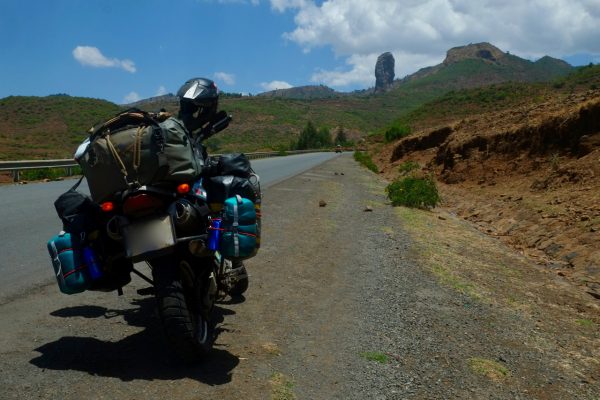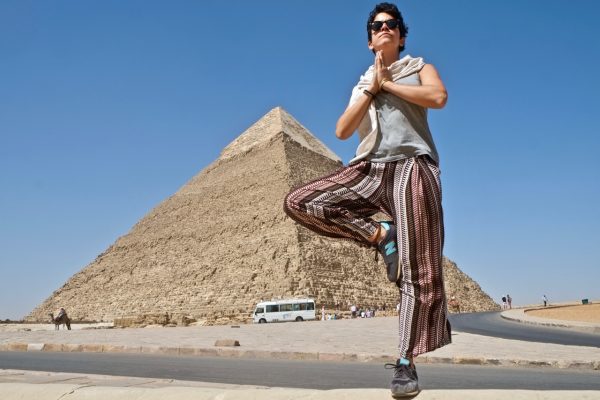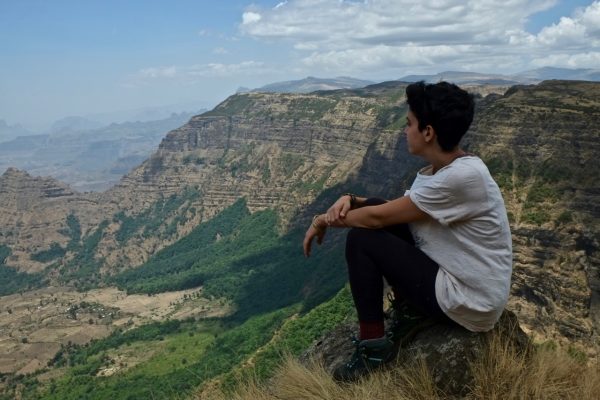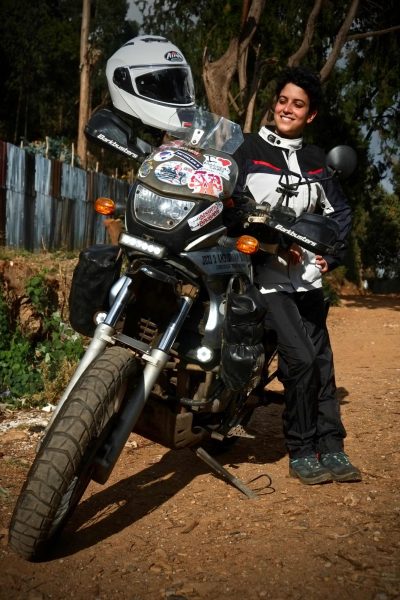Congratulations! You’ve decided to overcome your fears and jump on a motorbike for a road trip that will enter the family’s annals for generations to come.
What are you going to pack? Is it going to be hot or cold? How will you avoid backaches?
All legitimate questions I asked myself when I decided to jump on my boyfriend’s bike to cross six East African countries over four months – having never even driven a scooter!
Needless to say, I didn’t have all of the answers and I learned some of them on the road, which is why you should definitely read on if you’re getting ready for your first trip right now.

Comfort is… Queen!
Long trips are going to be physically challenging for both passengers and drivers, so it’s very important to be as comfortable as possible.
Protective bike clothing isn’t the most comfy, especially when new, as it’s very stiff. Just make sure you’re comfortable underneath. I recommend wearing a sports bra and a seamless t-shirt, preferably microfibre, for quick washing and drying in between rides.
Having a bag at the back of the bike is also a good way to make your seat more comfortable. While I took advantage of the trip to do some core strengthening – ditch the gym, jump on a bike! – I did need breaks once in a while, and having a backrest was genuinely a lifesaver!
If you’re going long-term or are an outdoorsy person, pack your camping equipment in your bag, but make sure it doesn’t get so heavy that it unbalances the whole bike. And remember: make sure it is well packed and compact. The last thing you want is a multiplug adaptor digging into your back for six hours straight!
Last but not least, ladies! If there is one thing you should do for your personal comfort on a long bike road trip, it’s this: get yourself a menstrual cup! It’s the key to traveling worry-free, especially since you’ll be spending lots of time sitting with your legs open!

The weather is not your friend
The ideal weather conditions for motorbike travel are an incredibly flimsy combination of factors, and they will depend on where you are, what the season is, and how long you are traveling for, among other things.
In my experience, the absolute best travel days happened when the sky was overcast, the temperature was around 72°F mark, it wasn’t too windy but a light breeze would blow when we stopped, and perhaps a shy ray of sun would peak through the thin layer of clouds once in a while. Not much to ask for, right?
In reality, you will spend most of the time being either too hot or too cold. It’s different for everyone, but I definitely hated feeling too cold. The wind can really get through to your bones and it may take a long time to feel like any blood is running through your veins after you catch a chill.
The best way to avoid this is to wear layers and have them all handy, so you can quickly add them on or strip them off as necessary. I was traveling through hot climates, so normally wore a sports bra and cotton t-shirt, with a long sleeve top and my jacket inner layer ready to slip on.

A good rule of thumb (although something I initially found counterintuitive) is that it’s better to keep your body temperature stable inside your clothes rather than trying to make it cooler or warmer by opening and closing ventilation zips and visor.
If it’s very hot outside, having a scolding breeze flowing through your helmet and jacket will actually make you hotter much more quickly than traveling with wet clothes and staying all zipped up to keep that little bit of cool.
Adrenaline wears off – and boredom kicks in
Traveling by bike is a beautiful thing: you take things slowly, meet more people, and see more places than you would if you were on a weeklong holiday, and also… you get bored!
Lush green forests, a road snaking through a valley locked in by rocky mountain chains, a bridge across a canyon, the scorching heat of the desert extending for miles…It all looks amazing and fills you with wonder at this beautiful world we live in. The first time.
After four hours looking at the desert on your left, right, back and front, boredom will kick in. It’s more sand, more mirages, more trees, more bridges, more gelada monkeys trying to open plastic wrappers thrown out by a bus driver. And then some more, for another three, five, eight hours.

It’s very important to bear this in mind and have strategies in place to fight it. A microphone and speaker are absolutely worth considering, so you can bang out those road trip tunes and chat with your travel companion or argue about the route.
And don’t forget to take breaks whenever possible. Though it may seem like a waste of time and a break in your flow, it’s important to keep the brain engaged to avoid going into autopilot. Get off the bike, stretch, drink water, listen to an episode of your favorite podcast – just make sure you’re switched on and alert!

Two – not three – is the magic number
Now for the most difficult part of motorbikes: not the engines, not the driving, not the heat or cold or same-y landscape. The packing!
Again, this will vary wildly depending on where you’re going and for how long, but in most cases, two is your magic number. If you bring two of everything excluding your riding clothes and shoes, you’ll be able to wear and wash stuff quickly, while keeping the load light.
Notable exceptions would be shoes (I suggest three: sandals, trainers, and flip-flops for showers and beach), underwear (you never know when the next laundry will be) and dresses (you can definitely leave the oh-so-pretty flowery one behind, trust me.)
Finally, be sure to take very good care of your feet, especially in hot climates. Spending four to six hours in heavy riding boots is going to take a toll on them, so make sure you have plenty of socks to change, a foot cream, and relevant toiletries.
Ready, set, passport…Go!
This is the most valuable lesson I learned over 8,000 km across East Africa.
There are going to be stops: police, roadblocks, refreshments, asking for directions. Especially when you’ve spent an hour packing in the morning, the last thing you want is to have to open the side bags on your bike and fish for stuff. So keep your important stuff – documents and cash – accessible!
Most riding jackets will have at least three pockets, two external and one internal, but you will likely have loads more. Turn them into departments and stick to them throughout your trip: it will make everything easier and quicker.
Your internal pocket is ideal for passport and larger amounts of cash, preferably wrapped in plastic to keep it dry while the right-hand side external one is good for a small pouch with essentials: small change for fuel and snacks, a couple of tissues to wipe the sweat and/or dust off, and lip balm (your lips will get very dry).
The left-hand side pocket remains as a bonus space you can use for anything. I used to keep my sunglasses in it, which made it very easy to stop, take my helmet off, and slip them straight on. A word of warning: while a pen is useful to have handy, don’t put it in your jacket. If you fall, the next thing you know you’ll be taken to a hospital with a pen sticking out from your side!

Once you’ve put these basic strategies in place, the foremost piece of advice is: don’t worry! Enjoy it, take everything in, feel the wind through your helmet, swoon gently with the bike on a bend, curse at the rain drenching you, immerse yourself in the elements, and be at one with nature.
It’s a wild ride, but it’s the best kind of ride!
